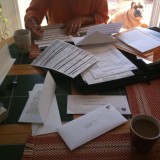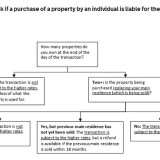Conveyancing Jargon Explained | Property Solicitor Terms
The property industry contains a lot of confusing terms and jargon, this can make conveyancing difficult to understand. So we’ve compiled a list of terms that you might not understand, and explained what they mean.
Conveyancing Terms Cheat Sheet
Another word for contract.
This is where a property is bought at an auction house. This is a public sale in which a property is sold to the highest bidder. Once a successful bidder has won the auction, the contracts are exchanged.
The conveyancers check whether a buyer or a borrower has been, is, or is about to be declared bankrupt.
Boundaries define the extent of the property and are often although not always shown on the deeds (usually marked by fencing, walls or hedging).
Bridging loans are short-term loans used by property buyers to ‘bridge’ the gap between the sale of their current home and purchase of their new home. This lets homeowners purchase a new home before selling their old one, these are great for anyone struggling to sell their current home.
Buildings insurance covers the cost of damage to the structure of a property. This insures damage to the walls, roof, ceilings, floors, doors and windows (outdoor structures like garages and fences are also included). It is normally the buyers responsibility to insure the property, conveyancers will recommend that a buyer insures their property before the exchange of contracts (see when should I buy home insurance? for more info). Property content isn’t covers by buildings insurance, you’ll need Contents Insurance for property content.
This is the sequence of buyers and sellers each dependent on the preceding purchase. This happens because most people who sell their property are also buying at the same time, but they can’t buy until their sale is successful, or can’t sell until their purchase is confirmed. This can create chains of sellers that depend on each other for the sale and purchase of their property. If one sale in the chain doesn’t go through, every property relying on that sale is delayed or even cancelled.
A property that is chain free doesn’t rely on any other sales/purchases and has no chain.
The date when the property transaction is completed. On this date you either become the owner (if buying) or you lose ownership (if selling).
A financial statement from your conveyancer/solicitor detailing all financial transactions (normally including their fees).
The terms within the contact that both the buyer and seller have to agree on regarding the sale. The Law Society sets standard conditions for a residential property sale, they can be found here: standard conditions of sale. The sellers solicitor/conveyancer can set special conditions for the sale.
This is the legally binding agreement specifying details of the house sale or house purchase (containing the conditions of sale). The house seller’s conveyancing lawyer draws up the and copies are sent to each party to sign. Once signed and exchanged, the contract legally commits both the buyer and the seller to the transaction.
The property lawyer/solicitor or licensed representative who manages all of the legal matters within property transactions.
Also known as the title deeds is a legal document showing the chain of ownership for land and property, including the current owner.
In conveyancing, this represents the moneys (normally 10% of the full sale price) paid by the buyer to the seller as a initial installment on the full property purchase. The deposit is rarely refundable.
These are necessary expenses paid by the solicitor/conveyancer for the buyer. Conveyancers will pass on the fees to the buyer, but may add their own service charges for each disbursement.
The right that someone may have to use land in a certain way even though they do not own that land. Or easement can prevent the owner of land from using it in a certain way.
Energy performance certificate, contains information about how energy is used in a property that includes energy costs.
This is how much of a property you own. So if you own a property, without any mortgage, you have 100% equity in that property.
This is when the contacts are agreed to and then exchanged between seller and buyer to sign. Both parties are committed to the transaction once the exchange is completed. For more info see: exchange of contacts.
Items that may be included or excluded from the property sale. For more info visit this page: What Are Fixtures & Fittings?
A form of ownership. This is a full ownership of both land and building.
The Financial Services Authority (FSA) regulates all providers of financial services in the UK; protecting customers.
When the property seller accepts an offer from another house buyer after initially accepting a different offer. Full explanation: What is gazumping?
Also known as the Sellers Pack, a HIP is a set of documents that provides the buyer with key information on the property and must be provided by the seller or the seller’s agent. It is a legal requirement to have a HIP and you can’t market your property without one.
This is an insurance for conveyancing firms to cover losses to clients, this covers sellers and purchasers for errors made by the firms (also covers fraud).
Full name, Her Majesty’s Land Registry (HMRC), is a government office that maintains a record of map based land registrations and ownership.
These are the fees that must be paid to the Land Registry office to register the new ownership of a property.
This is a form of property ownership. The leasehold owner wouldn’t actually own the land or property, they’d lease it for a set period of time (normally 80-100 year). This usually relates to a shared buildings such as flats or apartments. For more visit: What is a Leasehold Property? and our explanation to Leasehold Conveyancing.
A licensed conveyancer is a qualified specialist in property law that can manage all legal aspects of a property transaction.
An agreement drawn up by you mortgage lender. If you take out a mortgage loan, you will sign a mortgage deed, this gives the mortgage lender a lien on your home as security.
This term could be used for any fees relating to your mortgage. This could relate to fees from your lender or mortgage broker. It’s important to check all the mortgage fees in detail before agreeing to anything.
This is basically an administration fee that you will have to pay if you pay off your mortgage early or move your mortgage from your existing lender to another. Also known as a discharge fee, deeds fee, exit fee or sealing fee.
A way of checking matters that may affect the value of the property, this can include checks on the surrounding area. For more info: What are Property Searches?
If you’ve bought into a Shared Ownership home, you’ll own a percentage share of that property lease. Afterwards, you can buy further shares and own more of that property, or even buy outright ownership. This process is known as staircasing. For more info see: Staircase Conveyancing.
Stamp Duty Land Tax (SDLT) is a UK tax a buyer must pay when purchasing a property over £125,000. For a more detailed explanation visit our Stamp Duty Land Tax page that includes the current tax rate and a calculator.
This term normally refers to a structural report on the property for sale, it’s produced by a building surveyor. The report checks that the property is structurally sound and helps in the valuation.
An agreement that is not yet legally binding. So in conveyancing, the initial negotiations are ‘subject to contract’ until the exchange of contracts.
This is a formal land registry document that confirms transfer ownership of the legal title to land.
A surveyor will determine the value of a property. A valuation survey is required for mortgage lenders.







